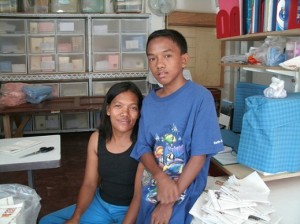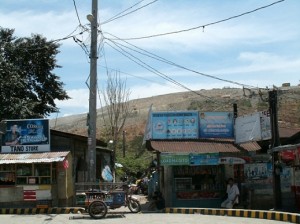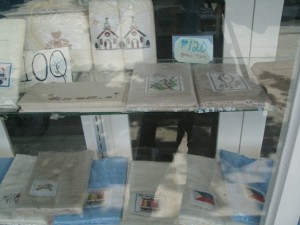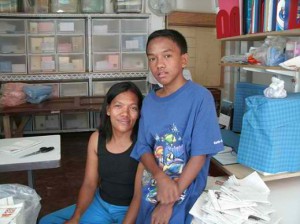By GAIL ORDUNA
 THERE’S more to life in Payatas than scavenging.
THERE’S more to life in Payatas than scavenging.
This is shown by a group of women living beside the Quezon City dumpsite who have learned new skills that provided them a more dignified alternative source of income.
One of them is Editha Macasusi, a 39-year-old resident of Lupang Pangako — a resettlement area in Payatas for those whose houses were demolished in Quezon City. She and her family have been living there since 1999.
Scavenging used to be the only source of income of most Payatas residents, including Macasusi, a mother of three. It provided her family an additional daily income of P150, which augmented her husband’s P300 daily wage as a construction worker.
Macasusi only earned P16 from her first scavenge, and half of it on her second attempt because she did not know what to pick, except for plastic cups and utensils.
After a month, she learned and got used to the trade. Her earnings rose to P300 to P700 a week. After six months, her entire family decided to live at the dumpsite.
In 2000, her husband also became a scavenger because he could not find any work with decent pay.
That same year, the Payatas tragedy happened when the mountain of trash beside Lupang Pangako eroded, burying more than 260 people.
“The dumpsite was closed and many of us in Lupang Pangako lost our only source of livelihood,” Macasusi recalled.
Luckily, she was already home with her kids a week before the “garbage-slide” happened. Biogas produces fires at random in the dumpsite, so they had to evacuate the place and go back home. Her husband, who was left at the dumpsite, managed to escape unharmed.
Macasusi, who only knows how to scavenge, had to find another place to look for useful trash to collect and sell. For the next three months after the tragedy, she and a friend scavenged the outskirts of Quezon City from East Ave. to Santolan, pushing a rented cart from 6 p.m. to 1 a.m. They sometimes even waited until 7 a.m. at the dumpsite for a buyer of their collected trash.
 “Despite all our efforts, we only earned P450 (daily),” she said. “We still had to pay P150 for the cart and (then) divide the P300 left between us.”
“Despite all our efforts, we only earned P450 (daily),” she said. “We still had to pay P150 for the cart and (then) divide the P300 left between us.”
Because of the small income, Macasusi had to look for other means to earn more money. She also sold promo packs of products, which meant an additional income of only less than a hundred pesos a day.
In 2001, her life changed for the better after she became a beneficiary of the SALT Foundation, a nongovernment community support organization run by the Japanese.
The name SALT is inspired by the white crystallines food seasoning. As salt gives good taste to food, SALT Foundation wants to give quality life to the poor.
Millet Morante, program manager of SALT’s children empowerment program, said SALT was founded in 1995 by a Japanese study tour participant, who has since provided scholarship to the children and livelihood trainings for mothers at Lupang Pangako. Both programs are highly selective of beneficiaries, accepting only families whose income is less than P3000 per month.
Morante said SALT’s livelihood program only accepted five mothers when it was first launched in 1998. After the tragedy, it opened up to more beneficiaries and now trains 20 mothers.
The program teaches them how to create cross stitch designs attached to bags, towels and book covers, among others, all of which are sold in Japan for P100 to P500 per item. The women in the program get 10 to 15 percent of the selling price.
When she was just starting in 2001, Macasusi could only finish three pieces of cross stitch designs a week. Now, she can make 20 pieces.
 That same year, she was also able to set up a sari-sari store at the dumpsite from the P40,000 she won from the game “Willie of Fortune” of the noontime variety show Wowowee.
That same year, she was also able to set up a sari-sari store at the dumpsite from the P40,000 she won from the game “Willie of Fortune” of the noontime variety show Wowowee.
Today, Macasusi does administrative work for SALT’s livelihood program in Lupang Pangako as its subleader with a take-home pay of P3000 a month. Her second child was also given a scholarship by SALT.
She now earns about thrice her income from scavenging. She continued to scavenge until 2006 although she was already a beneficiary of the program at that time.
Macasusi said: “No dumpsite, no livelihood. I am one of those who relied on the dumpsite for income. If I didn’t learn how to cross stitch, I would most probably still be scavenging until now.”
Through the livelihood program, she was also able to for her family’s basic needs, including sending her three children to school.
“There are many sources of income as long as one perseveres,” she shared. “No family will ever go hungry with perseverance.”
